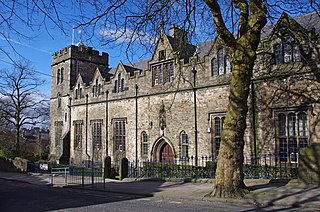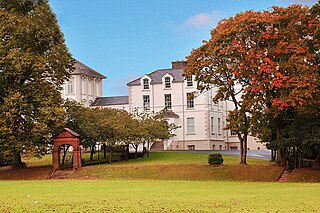Related Research Articles
Clive Staples Lewis was a British writer, literary scholar, and Anglican lay theologian. He held academic positions in English literature at both Magdalen College, Oxford (1925–1954), and Magdalene College, Cambridge (1954–1963). He is best known as the author of The Chronicles of Narnia, but he is also noted for his other works of fiction, such as The Screwtape Letters and The Space Trilogy, and for his non-fiction Christian apologetics, including Mere Christianity, Miracles, and The Problem of Pain.
Warren Hamilton Lewis was an Irish historian and officer in the British Army, best known as the elder brother of writer and professor C. S. Lewis. Warren Lewis was a supply officer with the Royal Army Service Corps of the British Army during and after the First World War. After retiring in 1932 to live with his brother in Oxford, he was one of the founding members of the Inklings, an informal Oxford literary society. He wrote on French history, and served as his brother's secretary for the later years of C. S. Lewis's life.
Lurgan is a town in County Armagh, Northern Ireland, near the southern shore of Lough Neagh. Lurgan is about 18 miles (29 km) south-west of Belfast and is linked to the city by both the M1 motorway and the Belfast–Dublin railway line. It had a population of about 28,634 at the 2021 UK census and is within the Armagh, Banbridge and Craigavon district. For some purposes, Lurgan is treated as part of the "Craigavon Urban Area" along with neighbouring Craigavon and Portadown.

Malvern College is a fee-charging coeducational boarding and day school in Malvern, Worcestershire, England. It is a public school in the British sense of the term and is a member of the Rugby Group and of the Headmasters' and Headmistresses' Conference. Since its foundation in 1865, it has remained on the same grounds, which are located near the town centre of Great Malvern. The campus, now covering some 250 acres, is near the Malvern Hills.

Campbell College located in Belfast, Northern Ireland and founded in 1894 comprises a preparatory school department and a senior Northern Ireland 'Voluntary Grammar' school, the latter meaning, in terms of provision of education, a government funded, selective school.

Methodist College Belfast (MCB), locally known as Methody, is a co-educational voluntary grammar school in Belfast, located at the foot of the Malone Road, Northern Ireland. It was founded in 1865 by the Methodist Church in Ireland and is one of eight Northern Irish schools represented on the Headmasters' and Headmistresses' Conference. It is also a member of the Independent Schools Council and the Governing Bodies Association.

Lancaster Royal Grammar School (LRGS) is an 11–18 boys grammar school in Lancaster, Lancashire, England. Old students belong to The Old Lancastrians. The school's sixth form opened to girls in 2019. LRGS is also in the United Kingdom's thirty oldest schools.
The Wallace High School is an 11–18 co-educational voluntary grammar school and sixth form in Lisburn, County Antrim, Northern Ireland.

The Royal Belfast Academical Institution is an independent grammar school in Belfast, Northern Ireland. With the support of Belfast's leading reformers and democrats, it opened its doors in 1814. Until 1849, when it was superseded by what today is Queen's University, the institution pioneered Belfast's first programme of collegiate education. Locally referred to as Inst, the modern school educates boys from ages 11 to 18. It is one of the eight Northern Irish schools represented on the Headmasters' and Headmistresses' Conference. The school occupies an 18-acre site in the centre of the city on which its first buildings were erected.

Forest School is a private day school in Walthamstow in the London Borough of Waltham Forest. The school occupies a large campus around its original Grade II listed Georgian and Victorian terraced buildings. The school has more than 1,430 pupils, aged 4 to 18, split equally between boys and girls.

Lurgan College is a selective, non-denominational, co-educational 14-19 Grammar School, situated in the town of Lurgan, County Armagh, Northern Ireland.
St Patrick's Grammar School, Armagh, is a Roman Catholic boys' non-selective voluntary grammar school in the city of Armagh, Northern Ireland. The present-day school was officially opened on Thursday, 27 October, 1988, by the late Cardinal Tomás Ó Fiaich, the then Chairman of the Board of Governors, and was the result of the amalgamation of two of Northern Ireland's oldest grammar schools, Christian Brothers' Grammar School and St. Patrick's College, both of which had traditions stretching back as far as the 1830s.
Banbridge Academy is a grammar school in Banbridge, Northern Ireland, founded in 1786. As of January 2015, the Principal is Robin McLoughlin, previously a headmaster of Grosvenor Grammar School. Mr McLoughlin succeeded Mr Raymond Pollock (1995-2014). Former headmaster Mr Pollock was preceded by Charles Winston Breen (1984–1995), a graduate of Trinity College, Dublin. Breen's work was continued by Pollock, who was made an Officer of the Order of the British Empire in the 2009 New Year Honours list "For services to Education in Northern Ireland".
Broomhedge is a small village in County Antrim, Northern Ireland, near Lisburn, approximately 12 miles (19 km) southwest of Belfast. It lies within the Lisburn and Castlereagh City Council area, and the Maghaberry electoral ward.

Our Lady and St Patrick's College, Knock, known locally as Knock or OLSPCK, is a Catholic diocesan grammar school in Knock in the east of Belfast in Northern Ireland. The school, with an expanding enrolment, announced in late 2019 it anticipated future enrolment of 1,330.
George Sydney Benedict Sayer was a teacher at Malvern College, trustee of the Lewis estate and probably best known for his biography of the author C. S. Lewis.

Coleraine Academical Institution was a voluntary grammar school for boys in Coleraine, County Londonderry, Northern Ireland.
Albert Lewis Stewart, was an Irish rugby union player and decorated British Army officer. He played for North of Ireland Football Club from 1907 to 1914, and made three appearances for the Ireland national rugby union team. During World War I, he served in the Royal Irish Rifles and the Machine Gun Corps. He was killed in action in the Battle of Broodseinde during the Battle of Passchendaele.
Thomas Edward Clouston was an Irish-born Presbyterian minister and academic in New South Wales.
References
- 1 2 3 4 5 6 Lewis, C. S. (1955). Surprised by Joy: The Shape of My Early Life . New York City: Harcourt Brace Jovanovich. pp. 128–186. ISBN 0-15-687011-8.
- 1 2 3 4 5 6 7 Wilson, Ian. "William Thompson Kirkpatrick (1848-1921)". Craigavon Historical Society. Retrieved 20 December 2015.